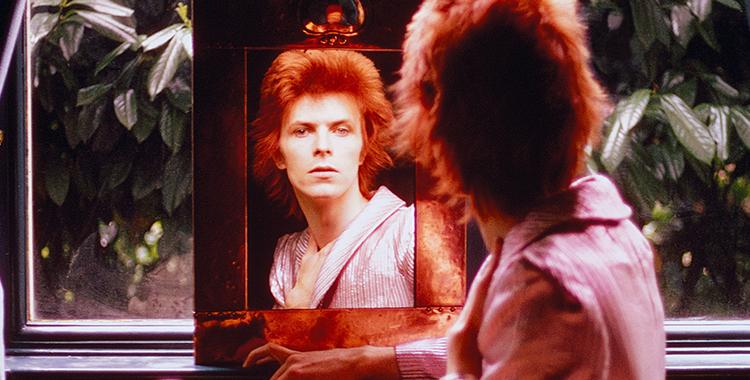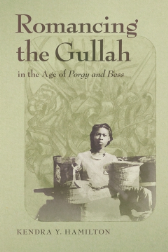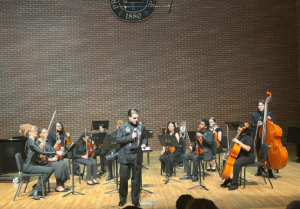Honoring Bowie With Individuality
January 18, 2016
“His fearless appearance gave permission to the rest of us to celebrate our difference.”
David Bowie in Mirror Hadden Hall, 1972 | Courtesy of taschen.com
Monday morning, January 11, I woke up not thinking about much, apart from the fact that I was meeting a couple of colleagues who are also on sabbatical for coffee. As usual, I opened my computer to Facebook, and the first post I saw was a cry “Nooooooo!!!!! F*****k, no! Heart. Broken.” What was wrong? Why was my friend so upset? I continued scrolling and each and every post following had a photograph or video of David Bowie under a written howl of grief. I felt all the air leave my lungs. I felt gutted.
How could this be possible? The two previous days, my feed had also been full of Bowie’s image, but those posts celebrated the release of his album, referred to as “Blackstar,” because of the image on the cover, and also wishing him a happy birthday. I searched to find more on the story, discovering that he had been suffering from cancer for eighteen months. The release of his album and the video for the song, “Lazarus,” seemed to coincide with and preview his death.
I spent the entire day poring over posts, tributes, reviews, videos, photo galleries, anything that had to do with Bowie. I was not alone in this. Friends and strangers alike collected every piece of Bowie miscellany and arcana, shared it, commented on it and went back for more. We were united in profound grief, and together we dug for some way to regain our equilibrium.
Why in the world would so many people, most born in the 1950s and 1960s, find themselves weeping and inconsolable over the death of a 69 year old man, whom a few had met, but none really knew? What is it about David Bowie that engendered that kind of feeling?
I remember exactly where I was the first time I heard “Space Oddity.” It was summer 1969, and I was out in the park with my portable radio. I was 12. I listened to rock and roll music, and had been raised on the Beatles, but this was almost literally otherworldly. I remember having a physical response almost like leaving my body. I had never heard anything like it. By the time I graduated from high school in 1975, David Bowie had released seven more albums, and killed off his most famous persona, Ziggy Stardust. His album “Young Americans” contributed two songs, the title song and “Fame,” featuring John Lennon on vocals, to the disco rotation. Who knew then this man’s capacity for reinvention?
David Bowie’s contributions to the culture did not end with music. In many ways, the music provided a soundtrack to everything else that was Bowie: outrageous fashion, gender-bending, glamor and strange success. Bowie’s circle intersected with many of the greatest artists, musicians and performers of the past 40 years, but this alone doesn’t explain his effect on people. His ability to transform into John Merrick, the Elephant Man, in a live theatrical performance, without any make-up or special effects, was testament to his illusionism. He was also almost too perfect in his earlier role as Thomas Jerome Newton, an alien from space, stranded on Earth, in Nicholas Roeg’s 1976 film, “The Man Who Fell to Earth.”
If you spot a trend here, it’s that Bowie gravitated toward the role of “he who does not belong.” Therein lies his greatest appeal, I think. When he appeared at the Glastonbury Festival in 1971, he had long flowing hair, and wore a dress. Within a year, he had brilliant red-orange hair, white face makeup, skin-tight brightly colored jumpsuits and red platform shoes. His transformations were not just about being different, but they celebrated difference, and his fearless appearance gave permission to the rest of us to celebrate our difference. Sure, at that time there were hippies, guys with long hair, countercultural movements. But this was unique. This wasn’t like anyone else. The hippies themselves had a kind of cultural conformity. Before each persona had a chance to become a commonplace, he shifted. He didn’t give permission to his fans to be different in a single way; he didn’t encourage people to follow him. He encouraged individual difference. All the weird kids, all the people who feared discovery for being mutants, aliens, outcasts, girly boys, made-up girls, he sang to us. If his songs have a running theme, it’s one of alienation and artifice.
All Bowie lovers have a favorite song, and they are as varied as the listeners. Mine comes from his fourth album, “Hunky Dory,” released in 1971. It’s called “Kooks,” and it’s directed at his infant son, né Zowie Bowie, now Duncan Jones. It’s a song about how to love.
[Chorus]
Will you stay in our lovers’ story?
If you stay you won’t be sorry
‘Cause we believe in you.
Soon you’ll grow so take a chance
With a couple of Kooks
Hung up on romancing.
We bought a lot of things
to keep you warm and dry,
And a funny old crib on which the paint won’t dry.
I bought you a pair of shoes
A trumpet you can blow
And a book of rules
On what to say to people
when they pick on you
‘Cause if you stay with us you’re gonna be pretty kooky too.
[Chorus]
And if you ever have to go to school
Remember how they messed up
this old fool.
Don’t pick fights with the bullies
or the cads
‘Cause I’m not much cop at punching other people’s Dads
And if the homework brings you down
Then we’ll throw it on the fire
And take the car downtown.
[Chorus]






